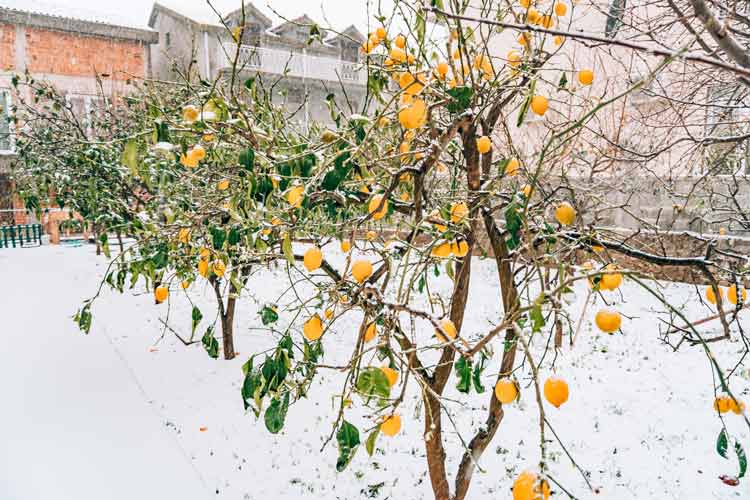Lemon trees are a subtropical fruit tree native to India that is now grown all across the tropical and subtropical regions of the world. While it is not eaten on its own because of its tart flavor, it is a common ingredient in cooking. As well, it is also a lovely ornamental, with glossy evergreen leaves setting off the yellow fruits.
In USDA zones 9 to 11, lemon trees continue to grow at a slower rate in winter, and fruit can be harvested from several varieties throughout the winter months, but it is possible they can be severely damaged or killed by sub-freezing temperatures.
Do Lemon Trees Survive in Winter?
Winter survival of lemon trees very much depends on the climate zone in which you are growing them, and how you protect them against colder weather.
They are a subtropical native and are not equipped to survive freezing temperatures.
Lemons are hardy in zones 9 to 11, which is why they are primarily grown in Florida and southern California as agricultural crops.
While they do go into semi-dormancy in the cooler winter months, varieties such as Meyer lemons continue to ripen fruit year-round.
Do Lemon Trees Lose Their Leaves in Winter?
Lemon trees are evergreen, so they usually retain most of their leaves through the winter months. However, they will not put out any new leaves until the spring.
Some factors may cause an increased leaf drop in winter.
If temperatures stay below 35°F (2°C) for too long, that can cause leaves to drop, as can exposure to cold winds.
If the winter temperatures in your region are well above that level, there are other possible causes of leaf drop.
They may need a dose of nitrogen-rich fertilizer. As well, if the soil’s pH isn’t between 5.5 and 6.5, that will have an impact on how well the roots can absorb the nutrients from the soil.
The lemon tree may also need more watering. Aim to occasionally deep water the soil, soaking it thoroughly.
Can You Harvest Lemons in the Winter?
Harvesting lemons in winter depends on a couple of key factors.
Some varieties of lemons tend to ripen during the winter months. These include Berna, Eureka, Interdonato, and Monachello.
You won’t be able to harvest even those varieties in a climate that is too cold, however. The fruits are very susceptible to damage from frost. Anything longer than 5 to 10 hours in temperatures a few degrees below freezing will seriously damage the fruit.
However, if you grow your lemon tree in a pot that can be moved inside your house or greenhouse for the winter, you should be able to pick ripe lemons all winter long.
What’s the Lowest Temperature Lemon Trees Can Survive?
The absolute minimum temperature that a lemon tree can survive is 20°F (-6°C).
Leaves may start to drop at temperatures below 50°F (10°C), and the tree’s growth will be stunted if those temperatures continue for a prolonged period.
Blossoms will be nipped at 29°F (-1.5°C), and the fruit will be damaged at 28°F (-2°C).
How to Properly Care for a Lemon Tree in the Winter
If you want to grow a lemon tree in a climate zone where temperatures are too cold for it to survive the winter unaided, you do have some options.
The most fool-proof way to care for a lemon tree in cold weather is to bring it inside for the winter.
You will need a dwarf variety such as Meyer Improved dwarf or Ponderosa dwarf.
Bring it in before temperatures fall below 50°F (10°C), and find a cool but sunny spot for your potted lemon tree. It will need as much sun as possible through the winter months indoors; at least 6 hours daily of sun are ideal.
Keep the soil consistently moist, and aim for humidity levels of about 50%.
In any zone colder than 9, you will need to protect your lemon tree from the cold weather.
Start when you plant the tree. Find a spot sheltered from north and west winds, where it will get plenty of sun. If you plant it in front of a south-facing brick or stone wall, the thermal mass will absorb the sun’s warmth during the day.
Mulch the soil well with a 2-inch (5cm) layer of shredded bark.
If there’s a brief cold snap in the forecast, just throw an old sheet or blanket over the tree. That will protect it from the cold air, and let any stored heat from the soil radiate up and keep the crown safe.
Also, water the soil deeply during the warmest part of the day to increase the amount of heat it will hold.
You can also wrap a string of Christmas lights through the branches to help keep the temperature up inside the covering. Even without a covering, those lights could help save your lemons.
If you’re expecting a longer spell of cold weather, wrap several layers of corrugated cardboard around the trunk, and cover the crown with a blanket or tarp.
You can also form a wire cage around the tree and wrap it in shade cloth or burlap to allow for air circulation.
Final Thoughts
Because they are such a popular fruit, many gardeners want to push the boundaries on where lemon trees can be safely grown. As long as you have a strategy in place to provide protection from cold weather, you may be able to harvest your own fresh lemons in winter!

Janice is a retired High School teacher who is spending her leisure years keeping busy with all sorts of projects. Aside from freelance writing, she’s an enthusiastic amateur chef, home wine maker, and tends a large raised-bed vegetable garden, while at the same time running a Bed & Breakfast.


